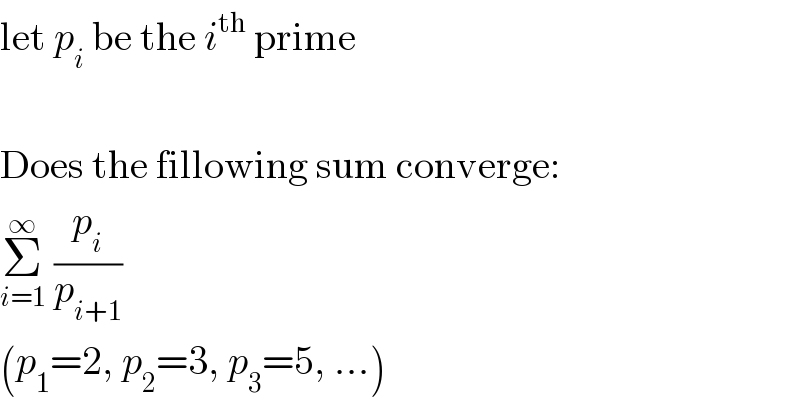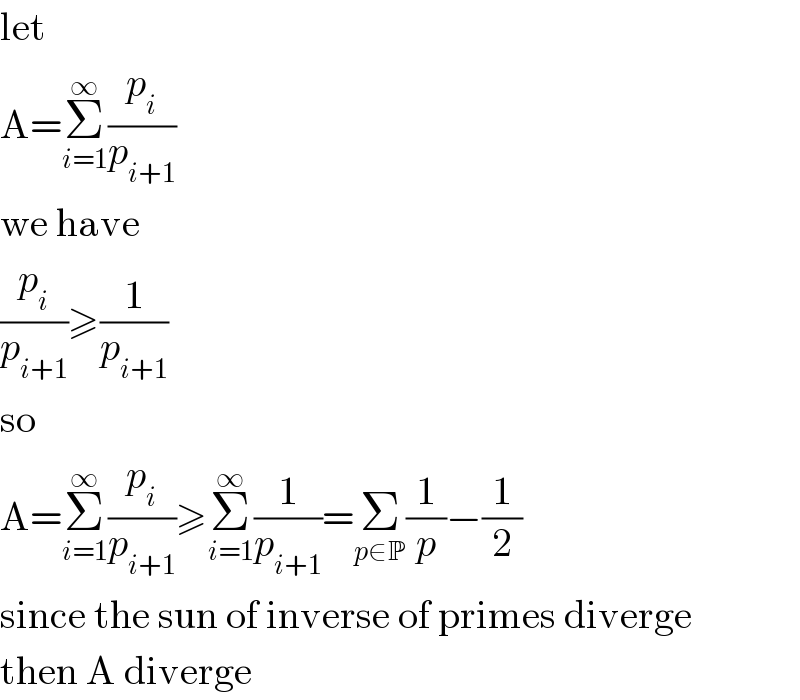
Question Number 3685 by Filup last updated on 19/Dec/15

$$\mathrm{let}\:{p}_{{i}} \:\mathrm{be}\:\mathrm{the}\:{i}^{\mathrm{th}} \:\mathrm{prime} \\ $$$$ \\ $$$$\mathrm{Does}\:\mathrm{the}\:\mathrm{fillowing}\:\mathrm{sum}\:\mathrm{converge}: \\ $$$$\underset{{i}=\mathrm{1}} {\overset{\infty} {\sum}}\:\frac{{p}_{{i}} }{{p}_{{i}+\mathrm{1}} } \\ $$$$\left({p}_{\mathrm{1}} =\mathrm{2},\:{p}_{\mathrm{2}} =\mathrm{3},\:{p}_{\mathrm{3}} =\mathrm{5},\:...\right) \\ $$
Answered by 123456 last updated on 19/Dec/15

$$\mathrm{let} \\ $$$$\mathrm{A}=\underset{{i}=\mathrm{1}} {\overset{\infty} {\sum}}\frac{{p}_{{i}} }{{p}_{{i}+\mathrm{1}} } \\ $$$$\mathrm{we}\:\mathrm{have} \\ $$$$\frac{{p}_{{i}} }{{p}_{{i}+\mathrm{1}} }\geqslant\frac{\mathrm{1}}{{p}_{{i}+\mathrm{1}} } \\ $$$$\mathrm{so} \\ $$$$\mathrm{A}=\underset{{i}=\mathrm{1}} {\overset{\infty} {\sum}}\frac{{p}_{{i}} }{{p}_{{i}+\mathrm{1}} }\geqslant\underset{{i}=\mathrm{1}} {\overset{\infty} {\sum}}\frac{\mathrm{1}}{{p}_{{i}+\mathrm{1}} }=\underset{{p}\in\mathbb{P}} {\sum}\frac{\mathrm{1}}{{p}}−\frac{\mathrm{1}}{\mathrm{2}} \\ $$$$\mathrm{since}\:\mathrm{the}\:\mathrm{sun}\:\mathrm{of}\:\mathrm{inverse}\:\mathrm{of}\:\mathrm{primes}\:\mathrm{diverge} \\ $$$$\mathrm{then}\:\mathrm{A}\:\mathrm{diverge} \\ $$
Commented by Filup last updated on 19/Dec/15

$$\mathrm{Nice}\:\mathrm{work}!!!! \\ $$
